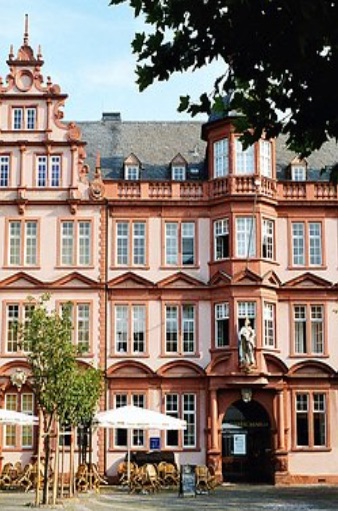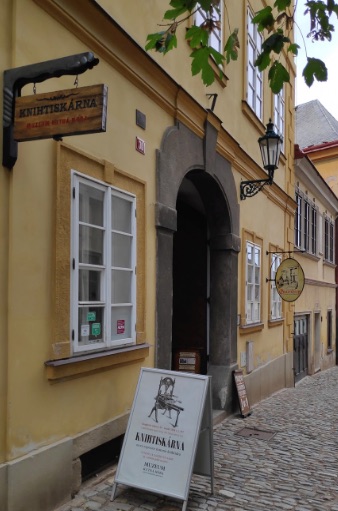Email and Virtual Interview



Dr. Cornelia Schneider from Gutenberg Museum Mainz in Germany.
Address: Liebfrauenplatz 5 55116 Mainz Germany
Dr. Václav Ondráček from Knihtiskárna History Museum in Czechia.
Address: Barborská 30/20, 284 01 Kutná Hora, Czechia
Professor Eunjae Park from Hallym University, Modern European History.
Address: 1 Hallimdaehak-gil, Okcheon-dong, Chuncheon-si, Gangwon-do


Professor Tamara C. Ho from University of California, Riverside, English literature. Address: 900 University Ave, Riverside, CA 92521, United States
Curatorial Assistant Dr. Eve Houghton from Beinecke Rare Book & Manuscript Library, Yale University.
Address: 121 Wall St, New Haven, CT 06511, United States
Schneider, Cornelia. “Interview with Dr. Cornelia Schneider.” Email Interview. 13 Jan. 2020.
Ondráček, Václav. “Interview with Dr. Václav Ondráček.” Email Interview. 8 Jan. 2020.
Park, Eunjae. “Interview with Professor Eunjae Park” Email Interview. April 30. 2020.
Ho, Tamara C. “Interview with Professor Tamara C. Ho” Virtual Interview. May 5. 2020.
Houghton, Eve. “Interview with Dr. Eve Houghton” Virtual Interview. May 17. 2020.
1. Do you think that the Latin language acted as the borderline among the social hierarchy?
Dr. Houghton: In early modern Europe, the use of Latin as the lingua franca in universities, churches, and law courts certainly did create a social barrier between those who had learned Latin and those who had not. At the same time, I think even people who were very competent Latinists dealt with anxiety about the debased or alienated quality of their Latin compared to the Latin spoken by the ancients.
Dr. Ho: Only 30% or ⅓ of the population of Europe was literate and managed to use Latin. Catholic Church members like the Monks had to learn Latin. For example, farmers were not literate. Not all people can speak Latin since it a language used for politics and science mainly. The pope and the Catholic church don’t want to teach Latin to the commoners and other people because they wanted people to rely on the Catholic Church to understand the Bible.
Dr. Park: Yes, indeed. Latin was mainly spoken by the elite, such as the clergy or aristocrats. Commoners spoke local dialects in daily life, so it was nearly impossible for them to understand the catholic mass, which was run in Latin.
Dr. Cornelia Schneider: Partially. The success of Gutenberg’s invention is based on the influence of the citizens of the Middle Ages who wanted and needed a network for information and news on their own.
Vaclav Ondracek: Much more was done for the general level of educations by schools, which started appearing towards the end of the 16th Century and among which had a dominant role Jesuit schools, later paralleled by protestant schools arisen from the imperative of ‘ethical humanism’ whose representatives can be seen in Ranke, Comenius or others. even some of those who had made their way up from poor beginnings already in the 16th Century benefited from such ‘public’ schools – established by cities or princes.
2. In terms of both spoken and written language, do you think that the upper class used more than two languages?
Dr. Houghton: I think that you would have expected an educated person in the fifteenth and sixteenth centuries to know at least three languages—the vernacular, Latin, and then probably another widely-spoken court, diplomatic, or legal language, like French. (In England, English, Latin, and French would have been standard.)
Dr. Ho: Most people spoke 2 languages along with 4 to 6 languages. People had to know 2 or more languages such as Latin and their own vernacular language. However, sometimes kings don’t all know Latin and had to rely on Government officials who know Latin. Many translators, scholars, and monks, who could speak and write Latin, were commonly used.
Dr. Park: The upper class in 15th C Europe must have been capable of speaking multiple languages. For a start, they spoke vernaculars, such as German, French, English. Some members of the upper class spoke more than two vernaculars, too. In England, for example, French was used among the royal family and courtiers for a long time.
3. Do you think that the invention of the printing press helped the world society formulate its current status? The literate were indeed able to communicate via text, but how about those illiterate? What kind of change did the printing press bring to society?
Dr. Ho: People who were illiterate couldn’t keep written languages. A lot of illiterate populations will preserve their knowledge orally. Didn’t have the capacity to have a record of their culture’s history and knowledge production until the modern-day of industrialization of popular literature. Library only had 200 manuscripts but the introduction of the printing press would allow the commoners to read different types of genre novels.
Dr. Houghton: Take a look at this important historiographical debate about to what extent the printing press was an "agent of change"—Elizabeth Eisenstein - "The Printing Press as an Agent of Change"; Adrian Johns - "The Nature of the Book." The advent of mass printing absolutely changed the book market, just in terms of scale: a scriptorium-based book would have taken many hours to produce, whereas printed books really changed the economy of production and allowed many more books to flood the market. The advent of "cheap print" later on in the sixteenth and seventeenth centuries, like pamphlets, almanacs, and playbooks, absolutely changed who had access to books in the sense of who could afford them. It's long been a commonplace that the printing press changed the production (and reproduction) of knowledge, arguably allowing ideas to spread faster and further than they would have otherwise—the extent to which this is true is explored in the Eisenstein/Johns debate, so I definitely recommend that you take a look at that.
4. The widespread of the printing press allowed to change the nature of technology, culture, economy, religion, and how nations deal with wars. In your opinion, which of the above aspects has, or have, influenced the most in shaping contemporary society?
Dr. Ho: Technology has enabled so many major world changes but the thing is that technology can be used for both good and bad reasons. It can help us learn and help us get access to technology. Newspapers that were printed from the printing press were controlled by the politicians from the governments.
Dr. Park: The invention of the printing press affected every area of life because it embodied the introduction of a new communication medium. But for the printing press, and the pamphlets and manuscripts that had been widely circulated, the Reformation wouldn't have caught on in the Continent. Because of the Reformation, Europe's Christian community came to be divided into Catholics and Protestants, and the conflict between them laid the basis for the emergence of modern nation-states. The Reformation also spurred the spread of literacy and printing culture as well as the development of academics.
Dr. Houghton: I think the printing press definitely changed early modern people's sense of culture and the intellectual field. Ann Blair has a great book called "Too Much to Know," which is about medieval and early modern people's sense that there was such a proliferation of knowledge and books in the world that no one would ever be able to read them. I think this sense that technology has made it impossible to master the field of knowledge is still with us today.